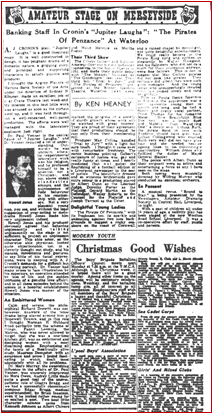|
|
<<
![]()
|
THE ARGOSY PLAYERS - LIVERPOOL |
![]()
|
Staged: 10 to 12 December 1953 at Crane theatre Hanover Street
Liverpool
Christmas 1953 is something of a watershed moment
for the Argosy Players, whose latest production packs out Liverpool’s Crane
Theatre on 10, 11 and 12 December.
They decide to get their teeth into what is, by all accounts a
fascinating and quite complex story, which requires high production values,
in addition to a high standard of acting.
A J Cronin, known to millions for his highly successful “Dr Finlay’s
Casebook” (which ran first on BBC TV and then Radio from 1962 until 1978),
writes a powerful and provokative story - “Jupiter Laughs”, which is a dark
tale of an atheist doctor obsessed with science, and his love interest whose
aim in life is to become a Christian missionary. The Liverpool Echo, which has long
championed Merseyside’s many and various operatic and dramatic societies,
prints a review of the play written by their correspondent Ken Heaney. As
well as the usual pictures and review published in Martins Bank Magazine, we
also reproduce Ken’s article, which is actually a glowing tribute to the
talented cast and crew of this production.
It goes to show that this particular arm of Martins Bank’s Society of
the Arts does not shy away from difficult or challenging material, and
manages to wow not just the local audience, but importantly the critics, with
its offerings. Although Martins Operatic Society continues after the 1969
merger with Barclays, we see the actors drift away to join other groups, and
to varying degrees of success. As you sit back now to enjoy “Jupiter Laughs”,
we should point out that the print quality of the newspaper article is none
too clear, so alongside it we have also reproduced the words of Ken Heaney…
The
sweetness of the first-named and the vixenish scheming of the last-named were
each played with outstanding skill and the performances of Nora and Maureen,
too, must rank among the best they have given us. The play contains one or
two little gems of character acting and in a company of great strength it was
possible to make sure that these were allotted to experienced people and not
to beginners, as so often has to be the case with minor parts. Maud Melville
played the part of the mother whose son dies whilst under treatment and there
is a fearful risk with this part that the audience may not take it seriously
when first she appears. However, it was safe with Maud and she got a burst of
applause at each performance. The ward maid was played by Joan Webster with
quite deceiving authenticity, a most excellently played little part.
The
elderly physician whom life has treated harshly was played by Norman Hubbard,
with a kindly, quiet dignity which won all hearts, and the occasional flash
of cynicism alienated nobody. We think his script should have been altered
from 70 to 60, however, in respect of his age. He did not make up as a
convincing septuagenarian. Two newcomers of great promise were Peter Gordon
and Audrey Little. Peter played the part of the young assistant physician
whose god is sport and his boyish love-making to the lady doctor had all the
gaucheness which the situation demanded. Audrey, as the wife of the Medical
Superintendent who carries on an illicit love affair with one of the doctors,
was excellent from first to last. These two are most valuable acquisitions to
the playing strength of the company.
Brian
Isaacson played the part of the Medical Superintendent. He had the height and
appearance for this somewhat pompous part, and he obviously knew how it
should be done, but we did not feel that his technique was quite equal to it
and the portrayal seemed at times artificial. Ken Johnson portrayed the part
of the representative of the firm which was willing to take the doctor
engaged on research on to their staff and provide him with the last word in
laboratories. We saw the performance on the first night and we had the
impression then that he needed to show a bit more blatant self-confidence to
get this part across to the best advantage, though the portrayal was quite
competent. The play was produced by Sydney N. Rimmer and was a very definite
addition to his laurels as a producer.
From
Liverpool Echo, 19 December 1953 Image
and Text © Reach PLC and Find my Past created courtesy of THE BRITISH LIBRARY
BOARD. Image
and Text reproduced with kind permission of The
British Newspaper Archive
AN EMBITTERED WOMAN Calm and serene, the philosophical Richard Drewitt was not
however, unaware of the tense drama being played around him at Hopewell
Towers, and in this role I though Norman H Hubbard fitted perfectly into the
scheme of things. Fanny Leeming, the
Matron, who was never allowed to forget she was a one-time kitchen girl, was
an embittered and designing woman with a most disarming smile. Emphasising all the faces of a theatrically
alive study, Maureen Dempster with an assurance and poise I found fascinating
to watch, dealt most adequately with all the problems. Dr Mary Murray, the sweetening influence in
the affairs of Dr Paul Venner, was sincerely interpreted by Nora Owen. Audrey Little made quite a good deal of the
unsympathetic role of Gladys Bragg, and we had a successfully obnoxiously
pompous Edgar Bragg, medical superintendent, by Brian Isaacson, even if he
looked rather young for so exalted a post.
Two neat little character cameos came from Kenneth Johnson as Albert
Chivers, and Maud Melville as Martha Foster.
|











